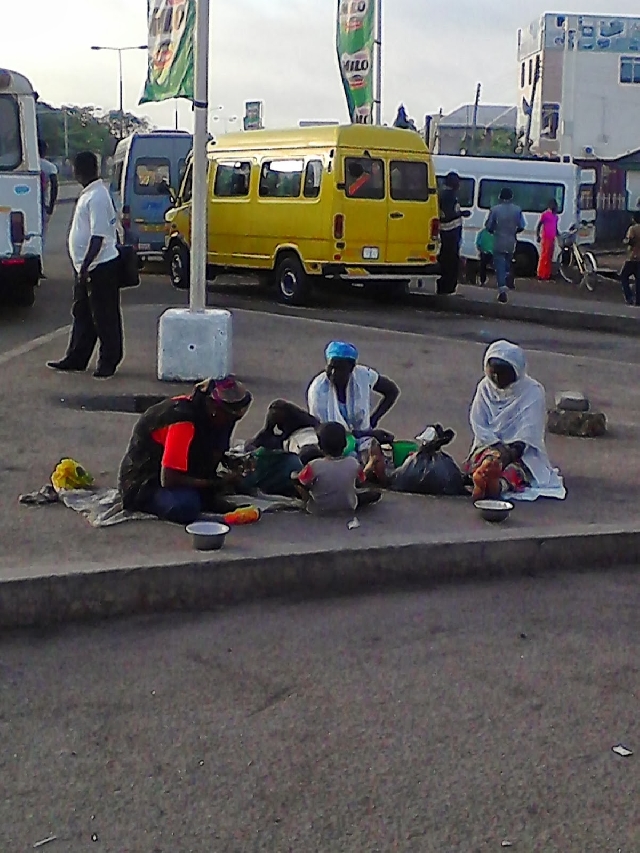Puppies today, monsters tomorrow
 Beggars
Beggars
A string of calabashes and bowls of various sizes lined up the Abossey Okai Traffic Light-Sabolai stretch of the Agbogbloshie road in the Greater Accra Region.
Their owners sat on mats and pieces of cloth that had been spread on the floor and kept an eagle eye on its content.
It was a wet morning as the moody clouds had started weeping, with strokes of the tears dripping on the ground, but that was no reason for 16-year-old Suraj Mousa and his business partner, 11-year-old Rafiq Muslim (not their real names), both Nigerien, to lay down their tools.
They joined scores to do what put food on their table – beg for money from the commuters.
Ever since they arrived in Ghana, three years ago, as irregular migrants, the pair have been in the begging business for their livelihood.
Unlike many other beggars, who operate mainly as sole proprietors, the business model of the teenage pair is one like partnership.
Rafiq, who was crippled at birth, brings into the business his condition as a person with disability (PWD), while Suraj brings in his strength.
Per their undocumented partnership deed, Suraj picks Rafiq up in a wheel chair at his base at Gaskia, Zongo near Abossey Okai and moves with him to strategic locations in town, looking for patrons.
Suraj told me that from dawn to dusk, they meander their way through fleets of vehicles, as they try to win the sympathy of the travelling public.
"Business is usually good in the early hours of the morning when people are driving to work.
When I get tired, we get a strategic location and pitch camp, so that passers-by can give us money.
We get between GH¢60 and GH¢80 on a good day," he said.
They share the proceeds from their daily exploits equally, but that is after they have taken out the portion for food and the GH?5 daily savings towards the repair of the wheelchair.
Worry
In slum communities such as Old Fadama, Abossey Okai Zongo and Sukura, the foreign beggars have converted the premises of business entities and shoulders of roads into homes, where they sleep at night and continue with their trade during the day.
Any time the clouds gather, they are left at the mercy of the weather.
Children are not left out of this painful ordeal.
Rather than a life in a safe home that will provide them security, they are brought up on the street, where privacy and peace of mind are secondary considerations.
While their colleagues are dressed for school early in the morning, they get dressed up for the streets, where they perfect the art of begging from older folks.
Unable to communicate in any local language, they will simply say "food, food," pointing to their mouths and caressing their bellies to win the sympathy of people.
Some will hold on to the hand of passers-by and walk considerable distances with them, in a desperate attempt to get a token from them.
If children under 10 are already on the streets begging and exposed to hostile conditions, what will they become at age 18? As they grow, their wants and needs get numerous, but how will they satisfy those needs with the peanuts they get from the benevolence of people?
As they age, their "food, food" strategy will no longer do the trick on people, but they will have to survive. As to what strategy they will adopt at that stage, your guess is as good as mine.
These child beggars are not going through any form of formal education, so what becomes of them in the next 10 to 20 years?
The complexity
According to the Chief Director of the Ministry of Gender, Children and Social Protection (MGCSP), Dr Afisah Zakariah, although there had been a comprehensive strategy to get all beggars and children off the street, the foreigners are particularly difficult to handle.
“Many of them are from Niger, so our ministry has been collaborating with the Nigerien embassy to repatriate them, but it is a complicated issue because the more the embassy sends some of the people home, the more others come into the country,” she said.
The official in charge of Migration at the MGCSP, Ms Abena Annoubea Asare, blamed the hundreds of foreigners who are on a begging spree on the streets on irregular migration.
“These people are seen as irregular migrants because they use unapproved routes to enter the country; are undocumented; they do not even know their destination or are using Ghana as a transit country to their destination.”
ECOWAS Protocol
Article 2 (1) of The Economic Community of West African States (ECOWAS) Protocol A/P.1/5/79 dubbed “General Principles on Movement of Persons, Residence and Establishment” states: “The Community citizens have the right to enter, reside and establish in the territory of Member States.”
In the words of the Director of the ECOWAS Protocols on the Movement of People and Goods at the commission’s directorate, Dr Tony Luka Elumelu, a community citizen is anybody from any member state that has the nationality of that state without the nationality of a third country,” where a third country refers to any country that falls outside the sub-region.
At a sensitisation campaign on free movement and migration held in Accra in August, this year, Dr Elumelu stressed that the sub-regional body was now focused on achieving its vision 2020, which aims to “transform an ‘ECOWAS of States’ into an ‘ECOWAS of its People.”
He stressed that under the revised ECOWAS treaty, community citizens were allowed to move into member states, reside, engage in economic activity and enjoy all other rights as the citizens of the host country, except that they cannot enter the security agencies.
Conclusion
As much as Ghana is an ECOWAS member state and, therefore, must respect the provisions of the ECOWAS Protocol, it is also important to be concerned about the activities of irregular migrants, especially, when they have taken over streets to engage in the infamous begging industry.
Begging is not a legitimate economic activity in Ghana, and so to the extent that the “community citizens” engage in this trade despite its health, security and other concerns, there is the need for swift action to curb it.
There is the need for collaboration between state agencies, especially the Ghana Immigration Service (GIS) and the MGCSP, to deal with this social issue before the puppies we see today grow into monsters.
Source: Timothy Ngnenbe
Trending Features

Rejoinder: Reject misleading calls to endorse vapes as tobacco harm reduction in Ghana's Public Health Act
23:34
The Moroccan transport wonder: AFCON 2025
10:54
When silence speaks louder than words
12:12
Project finance: A viable path to build Ghana’s infrastructure without overstretching or overburdening public Debt Ghana is facing mounting fiscal and infrastructure financing pressures
10:24
As awareness campaigns fade, new HIV infections rise
09:48




